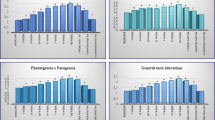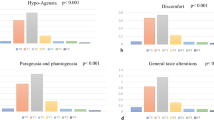Abstract
Purpose
This study retrospectively analyzed the risk factors for transchemotherapy dysgeusia.
Methods
Before each chemotherapy cycle, patients were routinely evaluated for the presence/severity of dysgeusia based on the Common Terminology Criteria for Adverse Events (CTCAE) v5.0 scale for adverse effects and graded as follows: 0, no change in taste; 1, altered taste with no impact on eating habits; or 2, altered taste with an impact on eating habits. Information from 2 years of evaluations was collected and patient medical records were reviewed to obtain data on chemotherapy cycle, sex, age, body mass index, body surface area, primary tumor, chemotherapy protocol, and history of head and neck radiotherapy. The X2 test and multinomial logistic regression were used for statistical analysis (SPSS 20.0, p < 0.05).
Results
Among 7425 total patients, 3047, 2447, and 1931 were evaluated after the first, second, and third chemotherapy cycles, respectively. One-fifth of the patients (19.0%) presented a significant loss of taste, with 1118 (15.0%) showing grade 1 dysgeusia and 442 (6.0%) showing grade 2 dysgeusia. The chemotherapy duration (p < 0.001), female sex (p < 0.001), location of the primary tumor in the uterus (p = 0.008), head and neck (p = 0.012), and testicles (p = 0.011), and use of ifosfamide (p = 0.009), docetaxel (p = 0.001), paclitaxel (p < 0.001), pertuzumab (p = 0.005), bevacizumab (p < 0.001), and dacarbazine (p = 0.002) independently increased the risk of dysgeusia. In head and neck tumors, a previous history of radiotherapy significantly increased the prevalence of dysgeusia (p = 0.017), and the use of cisplatin (p = 0.001) increased this prevalence.
Conclusion
Cycles of chemotherapy, sex, uterine cancer, head and neck tumors, testicular cancer, ifosfamide, docetaxel, paclitaxel, pertuzumab, bevacizumab, and dacarbazine increase the risk of dysgeusia.
Similar content being viewed by others
Data availability
N/A.
Code availability
N/A.
References
Gamper EM, Zabernigg A, Wintner LM, Giesinger JM, Oberguggenberger A, Kemmler G, Spenner-Unterweger B, Holzner B (2012) Coming to your senses: detecting taste and smell alterations in chemotherapy patients. A systematic review. J Pain Symptom Manag 44(6):880–895. https://doi.org/10.1016/j.jpainsymman.2011.11.011
Shapiro CL, Recht A (2017) Drug therapy: side effects of adjuvante treatment of breast câncer. Breast Cancer Res Treat 62(2):141–150
López BC (2014) Oral toxicity produced by chemotherapy: a systematic review. J Clin Exp Dent 6(1):81–e90. https://doi.org/10.4317/jced.51337
Sorokowska A, Schriever VA, Gudziol V, Hummel C, Hähner A, Iannilli E, Sinding C, Aziz M, Seo HS, Negoias S, Hummel T (2015) Changes of olfactory abilities in relation to age: odor identification in more than 1400 people aged 4 to 80 years. Eur Arch Otorhinolaryngol 272(8):1937–1944. https://doi.org/10.1007/s00405-014-3263-4
Chen YC, Hunter DJ (2015) Molecular epidemiology of câncer. Cancer J Clin 55(1):45–54. https://doi.org/10.3322/canjclin.55.1.45
Pugnaloni S, Vignini A, Borroni F, Sabbatinelli J, Alia S, Fabri M, Taus M, Mazzanti L, Berardi R (2020) Modifications of taste sensitivity in cancer patients: a method for the evaluations of dysgeusia. Support Care Cancer 28(3):1173–1181. https://doi.org/10.1007/s00520-019-04930-x
Ponticelli E, Clari M, Frigerio S, De Clemente A, Bergese I, Scavino E, Bernadini A, Sacerdote C (2017) Dysgeusia and health-related quality of life of cancer patients receiving chemotherapy: a cross-sectional study. Eur J Cancer Care 26(2):12633. https://doi.org/10.1111/ecc.12633
Kuba S, Fujiyama YRK, Morita M, Sakimura C, Hatachi T, Matsumoto M, Yano H, Ttasuki M, Hyashida N, Nagayasu T, Nagayasu T (2018) Awareness of dysgeusia and gustatory tests in patients undergoing chemotherapy for breast cancer. Support Care Cancer 26(11):3883–3889. https://doi.org/10.1007/s00520-018-4256-4
Sroussi HY, Epstein JB, Bensadoun RJ, Saunders DP, Lalla RV, Migliorati CA, Heavilin N, Zumsteg ZS (2017) Common oral complications of head and neck cancer radiation therapy: mucositis, infections, saliva change, fibrosis, sensory dysfunctions, dental caries, periodontal disease, and osteoradionecrosis. Cancer Med 6(12):2918–2931. https://doi.org/10.1002/cam4.1221
Kaufmann M, Morrow M, Von Minckwitz G, Harris JR (2010) Locoregional treatment of primary breast cancer. Cancer 116(5):1184–1191
Malta M, Cardoso LO, Bastos FI, Magnanini MMF, Silva CMFP (2010) STROBE initiative: guidelines on reporting observational studies. Rev Saude Publica 44(3):559–565. https://doi.org/10.1590/S0034-89102010000300021
Ruhl J, Adamo M, Dickie L (2016) SEER Program Coding and Staging Manual 2016: Section V. National Cancer Institute, Bethesda, MD:20850–29765
National CANCER INSTITUTE. Common Toxicity Criteria, Version 5.0(2017) Acessado em março de 2020, disponível http://safetyprofiler-ctep.nci.nih.gov/CTC/CTC.aspx
Sapir E, Tao Y, Feng F, Samuels S, El Naqa I, Murdoch-Kinch CA, Fng M, Schipper M, Eisbruch A (2016) Predictors of dysgeusia in patients with oropharyngeal cancer treated with chemotherapy and intensity modulated radiation therapy. Int J Radiat Oncol Biol Phys 96(2):354–361. https://doi.org/10.1016/j.ijrobp.2016.05.011
Amézaga J, Alfaro B, Ríos Y, Larraioz A, Ugartemendia G, Urruticoechea A, Tueros I (2018) Assessing taste and smell alterations in cancer patients undergoing chemotherapy according to treatment. Support Care Cancer 26(12):4077–4086. https://doi.org/10.1007/s00520-018-4277-z
Ishikawa M, Nakamura K, Shibata T, Tanaka K, Kitagawa R, Kobayashi H et al (2018) A randomized phase II/III trial of conventional paclitaxel and carboplatin with or without bevacizumab vs dose-dense paclitaxel and carboplatin with or without bevacizumab, in stage IVB, recurrent or persistent cervical carcinoma: Japan Clinical Oncology Group Study (JCOG1311). Jpn J Clin Oncol 48(12):1096–1100. https://doi.org/10.1093/jjco/hyy137
Okada N, Hanafusa T, Abe S, Sato C, Nakamura T, Teraoka K, Abe M, Kawazoe K, Ishizawa K (2016) Evaluation of the risk factors associated with high-dose chemotherapy-induced dysgeusia in patients undergoing autologous hematopoietic stem cell transplantation: possible usefulness of cryotherapy in dysgeusia prevention. Support Care Cancer 24(9):3979–3985. https://doi.org/10.1007/s00520-016-3244-9
Bressan V, Stevanin S, Bianchi M, Aleo G, Bagnasco A, Sasso L (2016) The effects of swallowing disorders, dysgeusia, oral mucositis and xerostomia on nutritional status, oral intake and weight loss in head and neck cancer patients: a systematic review. Cancer Treat Rev 45:105–119. https://doi.org/10.1016/j.ctrv.2016.03.006
Watters AL, Epstein JB, Agulnik M (2011) Oral complications of targeted cancer therapies: a narrative literature review. Oral Oncol 47(6):441–448. https://doi.org/10.1016/j.oraloncology.2011.03.028
Martini S, Iorio GC, Arcadipane F, Olivero F, Silvetti P, Rampino M, Demo PG, Fasolis M, Pecorari G, Airoldi M, Ricardi U, Ricardi U (2019) Prospective assessment of taste impairment and nausea during radiotherapy for head and neck cancer. Med Oncol 36(5):44. https://doi.org/10.1007/s12032-019-1269-x
Naik BS, Shetty N, Maben EVS (2010) Drug-induced taste disorders. Eur J Intern Med 21(3):240–243. https://doi.org/10.1016/j.ejim.2010.01.017
De Vries YC, Boesveldt S, Kelfkens CS, Posthuma EE, van Den Berg MMGA, de Kruif JTC, Haringhuizen A, Dommerijer DW, Buist N, Grosfel S, Graaf S, Laarrhoven HWM, Kampman E, de Graaf C (2018) Taste and smell perception and quality of life during and after systemic therapy for breast cancer. Breast Cancer Res Treat 170(1):27–34. https://doi.org/10.1007/s10549-018-4720-3
Leonard GD, Wright MA, Quinn MG, Fioravanti S, Harold N, Schuler B, Thomas RR, Grem JL (2005) Survey of oxaliplatin-associated neurotoxicity using an interview-based questionnaire in patients with metastatic colorectal cancer. BMC Cancer 5(1):116. https://doi.org/10.1186/1471-2407-5-116
Gonçalves LPV, Toledo OAD, Otero SAM (2010) Relação entre bruxismo, fatores oclusais e hábitos bucais. Dental Press J Orthodontics 15(2):97–104. https://doi.org/10.1590/S2176-94512010000200013
Wiesenferld AJ, Williams PM, Stevenson-Moore P, Wahlin YB, Ohrn KE, Elting LS, Spijkervet FKL, Brennan MT (2010) A systematic review of dysgeusia induced by cancer therapies. Support Care Cancer 18(8):1081–1087. https://doi.org/10.1007/s00520-010-0902-1
Palmeiras CCA, Ashmawi HA, Posso IP (2011) Sex and pain perception and analgesia. Rev Bras Anestesiol 61(6):820–828. https://doi.org/10.1590/S0034-70942011000600014
De Vries YC, Van Den Berg MMGA, De Vries JHM, Boesveldt S, de Kruif JTC, Buist N, Hatinghuizen A, Los M, Sommerijer DW, Timmer-Bonte JHN, van Laarhoven HWM, Visser M, Kmapman E, van Laarhoven HWM (2017) Differences in dietary intake during chemotherapy in breast cancer patients compared to women without cancer. Support Care Cancer 25(8):2581–2591. https://doi.org/10.1007/s00520-017-3668-x
Bestvina CM, Fleming GF (2016) Chemotherapy for endometrial cancer in adjuvant and advanced disease settings. Oncologist 21(1):1250–1259. https://doi.org/10.1634/theoncologist.2016-0062
Ng K, Duncan S, Shamash J, Alifrangis C (2018) Dose intense chemotherapy in the management of poor prognosis and relapsed testicular cancer: experiences and controversies. Expert Rev Anticancer Ther 18(5):431–436. https://doi.org/10.1080/14737140.2018.1454313
Rohde S, Kovács AF, Turowski B, Yan B, Zanella F, Berkefeld J (2005) Intra-arterial high-dose chemotherapy with cisplatin as part of a palliative treatment concept in oral cancer. Am J Neuroradiol 26(7):1804–1809
Skiba-Tatarska M, Kusa-Podkańska M, Surtel A, Wysokińska-Miszczuk J (2016) The side-effects of head and neck tumors radiotherapy. Polski merkuriusz lekarski: organ Polskiego Towarzystwa Lekarskiego 41(241):47–49
Amosson CM, Teh BS, Van TJ, Uy N, Huang E, Mai WY, Frolov A, Woo SY, Chiu JK, Carpenter LS, Lu HH (2003) Dosimetric predictors of xerostomia for head-and-neck cancer patients treated with the smart (simultaneous modulated accelerated radiation therapy) boost technique. Int J Radiat Oncol Biol Phys 56(1):136–144. https://doi.org/10.1016/s0360-3016(03)00093-2
Fang FM, Tsai WL, Chien CY, Chiu HC, Wang CJ, Chen HC, Hsiung CY (2005) Changing quality of life in patients with advanced head and neck cancer after primary radiotherapy or chemoradiation. Oncology 68(4-6):405–413. https://doi.org/10.1159/000086982
Just T, Pau HW, Bombor I, Guthoff RF, Fietkau R, Hummel T (2005) Confocal microscopy of the peripheral gustatory system: comparison between healthy subjects and patients suffering from taste disorders during radiochemotherapy. Laryngoscope 115(12):2178–2182. https://doi.org/10.1159/000086982
Guan J, Li Q, Zhang Y, Xiao N, Chen M, Zhang Y, Xiao N, Chen M, Zhang Y, Li L, Chen L (2016) A meta-analysis comparing cisplatin-based to carboplatin-based chemotherapy in moderate to advanced squamous cell carcinoma of head and neck (SCCHN). Oncotarget 7(6):7110. https://doi.org/10.18632/oncotarget.6858
Steinbach S, Hummel T, Böhner C, Berktold S, Hundt W, Kriner M, Harbeck N (2009) Qualitative and quantitative assessment of taste and smell changes in patients undergoing chemotherapy for breast cancer or gynecologic malignancies. J Clin Oncol 27(11):1899–1905. https://doi.org/10.1200/JCO.2008.19.2690
Sánchez-Lara K, Sosa-Sánchez R, Green-Renner D, Rodríguez C, Laviano A, Motola-Kuba D, Arrieta O (2010) Influence of taste disorders on dietary behaviors in cancer patients under chemotherapy. Nutr J 9(1):15. https://doi.org/10.1186/1475-2891-9-15
DE Bono JS, Oudard S, Ozguroglu M, Hensen S, Macheils JP, Kocak I, Gravis G, Bodrogi I, Mackenzie MJ, Shen L, Roessner M, Gupta S, Sartor AO (2010) Prednisone plus cabazitaxel or mitoxantrone for metastatic castration-resistant prostate cancer progressing after docetaxel treatment: a randomised open-label trial. Lancet 376(9747):1147–1154. https://doi.org/10.1016/S0140-6736(10)61389-X
Author information
Authors and Affiliations
Contributions
Malta CEN, Martins JOL, and Matos Carlos ACA reviewed the medical records and collected and data. They read and accepted the final version of the manuscript.
Freitas MO and Magalhães IA strategically organized the database for analysis. They read and accepted the final version of the manuscript.
Vasconcelos HCA and Silva-Fernandes IJL critically interpreted the data and analyzes and wrote the article. They read and accepted the final version of the manuscript.
Barros Silva PG designed the study and statistical approach, wrote the article, and read and accepted the final version of the manuscript.
Corresponding author
Ethics declarations
Ethics approval
The Research Ethics Committee approved this HHJ/ICC project (protocol number 4,062,135).
Consent to participate
N/A.
Consent for publication
The authors declare consent for publication.
Conflict of interest
The authors declare no competing interests.
Additional information
Publisher’s note
Springer Nature remains neutral with regard to jurisdictional claims in published maps and institutional affiliations.
Supplementary Information
ESM 1
(DOCX 34 kb)
Rights and permissions
About this article
Cite this article
Malta, C.E.N., de Lima Martins, J.O., Carlos, A.C.A.M. et al. Risk factors for dysgeusia during chemotherapy for solid tumors: a retrospective cross-sectional study. Support Care Cancer 30, 313–325 (2022). https://doi.org/10.1007/s00520-021-06219-4
Received:
Accepted:
Published:
Issue Date:
DOI: https://doi.org/10.1007/s00520-021-06219-4




